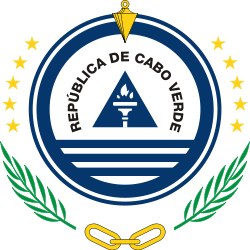Politics of Cape Verde
 |
|---|
| This article is part of a series on the politics and government of Cape Verde |
|
Legislature |
|
Judiciary
|
Politics of Cape Verde takes place in a framework of a semi-presidential representative democratic republic,[1] whereby the Prime Minister of Cape Verde is the head of government and the President of the Republic of Cape Verde is the head of state, and of a multi-party system.[2][3] Executive power is exercised by the President and the Government. Legislative power is vested in both the Government and the National Assembly. The Judiciary is independent of the executive and the legislature. The constitution first approved in 1980 and substantially revised in 1992 forms the basis of government organization. It declares that the government is the "organ that defines, leads, and executes the general internal and external policy of the country" and is responsible to the National Assembly.[4]
Political conditions
Following independence in 1975, the African Party for the Independence of Guinea and Cape Verde (PAIGC) established a one-party political system. This became the African Party for the Independence of Cape Verde (PAICV) in 1980, as Cape Verde sought to distance itself from Guinea-Bissau, following unrest in that country.
In 1991, following growing pressure for a more pluralistic society, multi-party elections were held for the first time. The opposition party, the Movement for Democracy (Movimento para a Democracia, MpD), won the legislative elections, and formed the government. The MpD candidate also defeated the PAICV candidate in the presidential elections. In the 1996 elections, the MpD increased their majority, but in the 2001 the PAICV returned to power, winning both the Legislative and the Presidential elections.
Generally, Cape Verde enjoys a stable democratic system. The elections have been considered free and fair, there is a free press, and the rule of law is respected by the State. In acknowledgment of this, Freedom House granted Cape Verde two 1st in its annual Freedom in the World report, a perfect score. It is the only African country to receive this score.
The Prime Minister is the head of the government and as such proposes other ministers and secretaries of state. The Prime Minister is nominated by the National Assembly and appointed by the President. The President is the head of state and is elected by popular vote for a five-year term; the most recent elections were held in 2011.
also in the legislative branch The National Assembly (Assembleia Nacional) has 72 members, elected for a five-year term by proportional representation.
Political parties and elections
Administrative divisions
Cape Verde is divided into 22 municipalities (concelhos, singular - concelho): Boa Vista, Brava, Maio, Mosteiros, Paul, Porto Novo, Praia, Ribeira Grande, Ribeira Grande de Santiago, Sal, Santa Catarina, Santa Catarina do Fogo, Santa Cruz, São Domingos, São Filipe, São Lourenço dos Órgãos, São Miguel, São Nicolau, São Salvador do Mundo, São Vicente, Tarrafal, Tarrafal de São Nicolau.
Voting rights for noncitizens
Article 24 of the Cape Verde Constitution[2] states that
- alinea 3.: "Rights not conferred to foreigners and apatrids may be attributed to citizens of countries with Portuguese as an official language, except for access to functions of sovereignty organs, service in the armed forces or in the diplomatic career."
- alinea 4. "Active and passive electoral capacity can be attributed by law to foreigners and apatrid residents on the national territory for the elections of the members of the organs of the local municipalities."
The website of the governmental Institute of Cape Verde Communities states that such a measure was adopted "to stimulate reciprocity from host countries of Cape Verdian migrants".[5]
A law nr. 36/V/97 was promulgated on August 25, 1997 regulating the "Statute of Lusophone Citizen", concerning nationals from any country member of the Community of Portuguese Language Countries (article 2), stating in its article 3 that "The lusophone citizen with residence in Cape Verde is recognized the active and passive electoral capacity for municipal elections, under conditions of the law. The lusophone citizen with residence in Cape Verde has the right to exercise political activity related to his electoral capacity."[6]
International organization participation
ACCT, ACP, AfDB, AU, CCC, ECA, ECOWAS, FAO, G-77, IBRD, ICAO, ICRM, IDA, IFAD, IFC, IFRCS, ILO, IMF, International Maritime Organization, Intelsat, Interpol, IOC, IOM (observer), ITU, ITUC, NAM, OAU, OPCW, UN, UNCTAD, UNESCO, UNIDO, UPU, WHO, WIPO, WMO, WTrO (applicant)
Sources
- ↑ Neto, Octávio Amorim; Lobo, Marina Costa (2010). "Between Constitutional Diffusion and Local Politics: Semi-Presidentialism in Portuguese-Speaking Countries". Social Science Research Network. SSRN 1644026.
- 1 2 "Constituição da República de Cabo Verde" (pdf) (in Portuguese). 2010. Retrieved 2014-06-07.
- ↑ "Constitution of Cape Verde" (PDF). 1992. Retrieved 2011-03-20.
- ↑ "Cape Verde 1980 (rev. 1992)". Constitute. Retrieved 22 April 2015.
- ↑ "Cidadania" (in Portuguese). Instituto das Comunidades de Cabo Verde. Archived from the original on 2007-08-14. Retrieved 2007-12-13.
- ↑ "Lei nº36/V/97 - Estatuto de Cidadão Lusófono - Cabo Verde" (in Portuguese). "Boletim Oficial", I Série, Nº.32, 25 de Agosto de 1997, Cabo Verde. Archived from the original on 2003-06-21. Retrieved 2007-12-14.
External links
- Government of Cape Verde
- National Assembly of Cape Verde
- Official site of the President of Cape Verde Archived 13 July 2011 at the Wayback Machine.
- Chief of State and Cabinet Members
- Supreme Court
- EU Relations with Cape Verde
| Wikimedia Commons has media related to Politics of Cape Verde. |